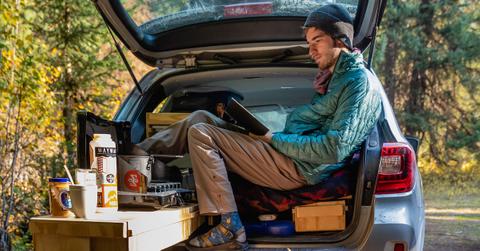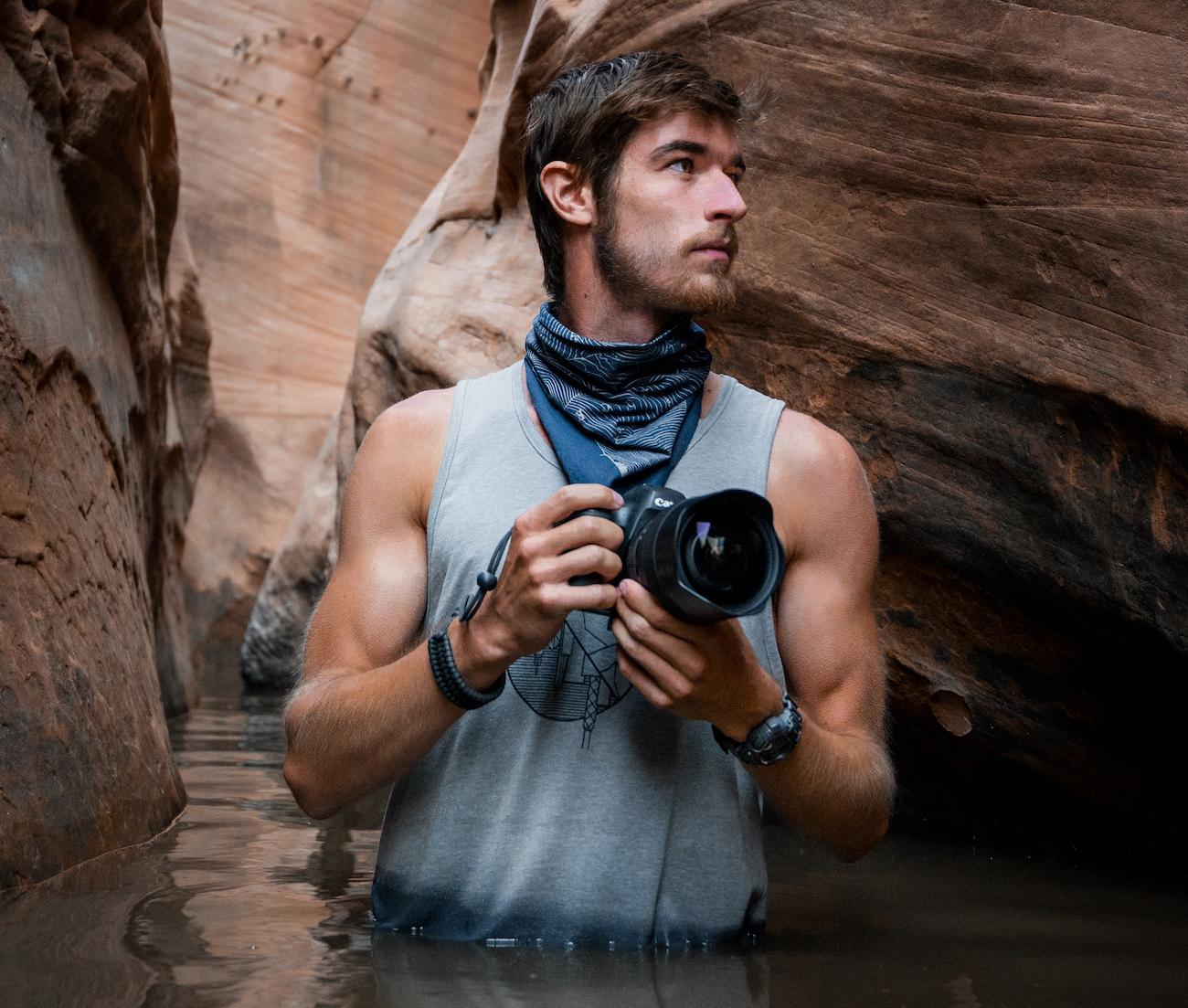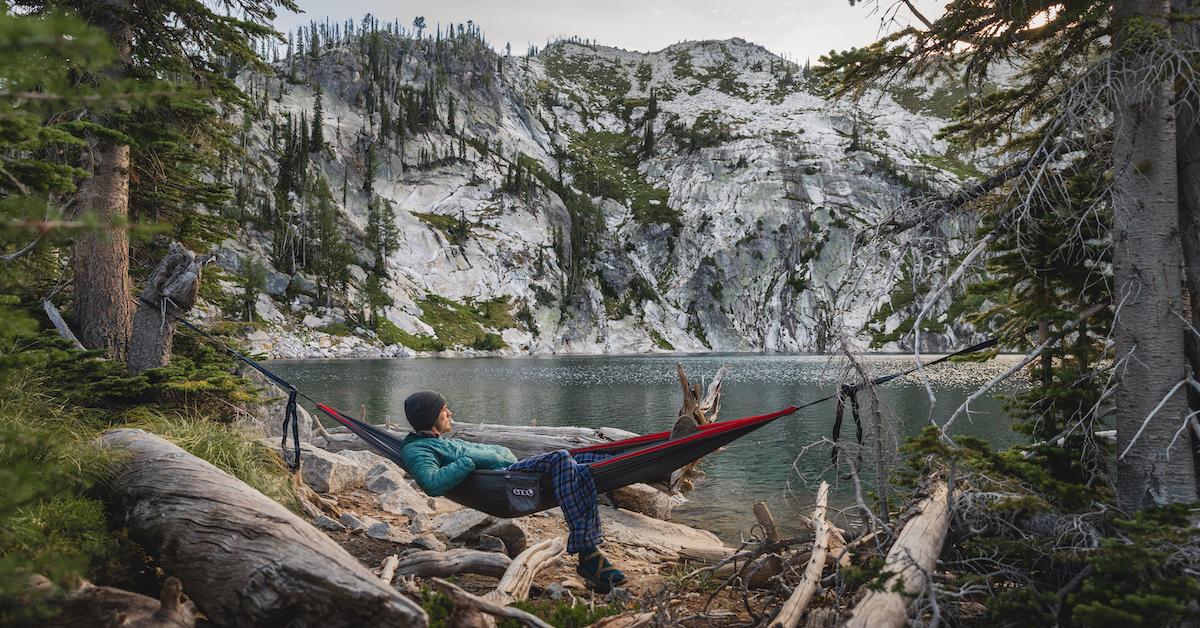23-Year-Old TikToker Lives in His Car in the Backcountry to Inspire Climate Action (Exclusive)
Published July 16 2021, 9:58 a.m. ET

Many people turned to nature in the early months of coronavirus lockdowns — but perhaps no one did as much as TikTok’s Alex Haraus. In August of 2020, Haraus, now 23, downsized his life to fit into a car, and he became a permanent nomad. He has spent the past year sleeping in his car amongst nature by night, and growing his massive TikTok following by day — which he uses to inspire people to take action on climate issues.
From the great outdoors on the edge of a forest in Oregon, Haraus recently caught up with Green Matters over the phone to reflect on his first year living in nature, the pros and cons of the lifestyle, and how he’s using his platform to fight climate change.

At a young age, Alex Haraus is living independently in nature.
“What inspired me to go for it was genuinely just a desire to live on the road, and the desire to make a difference,” Haraus tells Green Matters. Not only was living in the backcountry a dream of his, but he also hoped it would bring him some “credibility and attention” that would convince people to listen to him talk about conservation and climate justice.
In early 2020, a few years after earning a bachelor's degree in environmental science, Haraus moved to Colorado in pursuit of working for an environmental nonprofit. He picked up a part-time job in the meantime, and two weeks later, he was laid off due to the coronavirus pandemic. Soon after, he got a pricey speeding ticket, costing him most of what he’d earned at his part-time job. He realized the job market wasn’t going to pick up anytime soon — so, he started a Patreon, asking for support from his modest (at the time) Instagram following.
Using money from his patrons and his unemployment checks, he was able to purchase a car. On Aug. 2, Haraus officially became a man without an address, instead calling his Subaru Outback — wherever he parked it amidst the West Coast wilderness — home. “COVID kind of forced the hand and gave me the motivation that I guess needed to go for that dream,” he tells us. “And here we are, doing the thing. And I’ve absolutely loved it.”
Haraus has found there are pros and cons to living in his car.
Haraus’ biggest cons of living in the backcountry are all related to logistics: getting food, finding somewhere to work comfortably, and getting a signal when he needs to make work calls and upload videos to TikTok.
But all that is worth it for the biggest pros of being on the road. Haraus loves “being able to experience these beautiful places that I wouldn't take the time to go see otherwise,” as well as being able to easily visit friends wherever they live. His body has also grown accustomed to the peaceful setting and clock of nature — when the sun goes down, “you’re forced to at the end of the day stop working,” and all of this has helped his stress decrease over the past year.

Additionally, Haraus has found the lifestyle to be more eco-friendly than a traditional lifestyle in a house or apartment, as it’s forced him to become a minimalist, and start acquiring experiences rather than things. He says, “Working to develop skills that allow you to have really, really interesting experiences, and go places that you would not otherwise be able to go — for me personally, that's what makes a life.”
Alex Haraus is well-loved on TikTok.
Haraus only started his TikTok account in November 2020, but it grew quickly. A video he posted just one week after joining TikTok went viral with more than 421,000 views, and he now has over 455,000 TikTok followers.
Some of Haraus’ most popular videos are response videos to TikToks about dating — making his climate call-to-action punchlines even funnier, as well more effective in getting people to write letters or make donations to the campaigns he’s promoting.
Alex Haraus ran a TikTok campaign to raise awareness for protecting the ANWR.
Over the winter, Haraus led a TikTok movement in support of Protect The Arctic’s campaign to stop oil drilling in the Arctic National Wildlife Refuge (ANWR), which the Trump administration had approved in mid-2020.
The campaign pulled in more than 6.3 million public comments in three weeks, and on President Joe Biden’s first day in office, he signed an executive order to halt all oil leases in the ANWR. That said, the fight to protect the ANWR is not over yet, as Biden’s pause is not permanent.
Now, Haraus is working to combat food deserts with community gardens.
Haraus is now promoting the Dollar Gardens campaign, which he came up with along with his community via discussions on Discord. The campaign aims to bring attention to the 23 million+ Americans who live in food deserts (also known as food oppression or food apartheid), which are neighborhoods (typically low-income ones) that have limited access to affordable, fresh, and nutritious foods.
Nonprofit SeedMoney is running the Dollar Gardens campaign, and the organization will use the money raised to offer grants to applicants who want to build community gardens in their neighborhoods. So that everyone’s donation has the same impact, the maximum donation anyone can make to the Dollar Gardens campaign is $1.
“Community gardens, I think, are a really good way to encourage communities, and outfit communities with the ability to grow produce for themselves,” Haraus says. He hopes the community gardens will help “make healthy food accessible and bring communities together in a way that's positive, that builds trust, that builds togetherness, [and considers] the impacts of climate change on the greater mass agriculture system.”
Haraus acknowledges that there are many solutions to food deserts, “But, community gardens are a really really good way to outfit places [with accessible fresh food], and be a part of the solution that ends [food deserts] permanently,” he says.
Haraus’ platform has grown so much over the past year , and he encourages his followers to use their voices to stand up for causes they believe in, too.
“You, as an individual, are your niche,” he tells Green Matters. “So if there is anyone reading this that has a cause that they're passionate about, or has a change that they want to see in the world, I really, really want to encourage them to get out and do that, and chase that dream.”